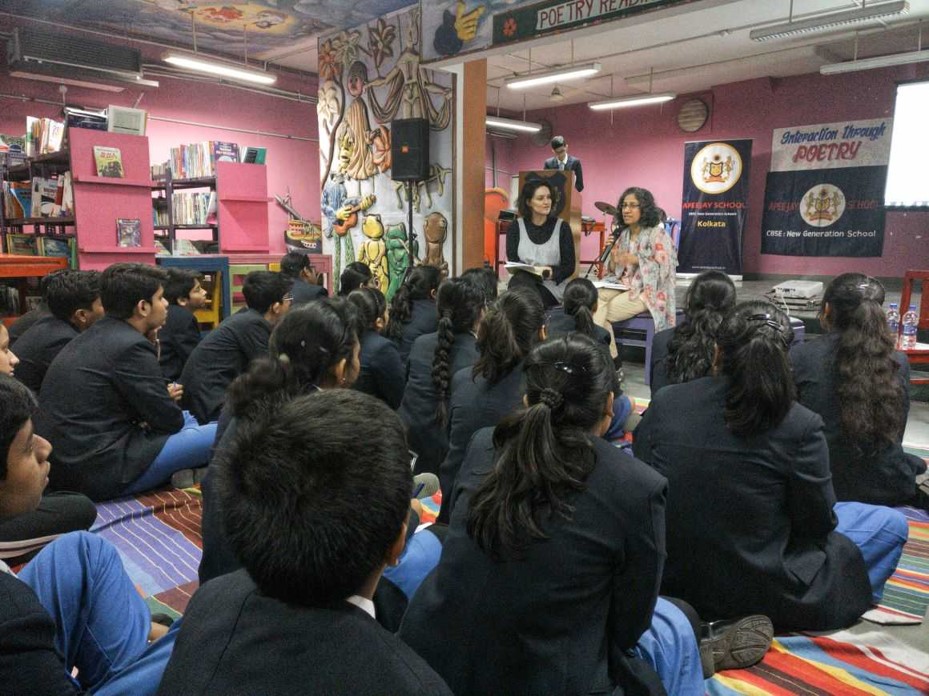Following an initial writing residency on the Isle of Lewis in August 2017 – reflections on which you can read on this site – last month novelist Abir Mukherjee and poet Nalini Paul travelled to Kolkata to work with two India-based writers: poet Sampurna Chattarji and novelist and journalist Sandip Roy. The authors are encouraged to creatively respond to items from the Mackenzie Collection, a rich and renowned collection of Asian art collected by Stornoway-born Colonel Colin Mackenzie during his time in India as its first surveyor general, and give new voice to the ongoing relationship between Scotland and India as these nations continue to define and redefine their contemporary relationships. The group will share their conclusions at the 2018 Edinburgh International Book Festival.
The following piece is the second response from Nalini Paul. Nalini was born in India, grew up in Vancouver, and has been living in Scotland for most of her adult life. As a keen walker and lover of the outdoors, her writing often touches on themes of migration, memory and landscapes. Read Nalini’s first response here.
Distinctness amidst the haze

Nalini speaks to local pupils at a special event during her visit at Apeejay School, Kolkata
I hated Kolkata at first: the filth, the noise, the crowds, the uneven pavements shared by mangy dogs. This is not a place for the faint-hearted — and I was amazed that my non-Indian colleagues seemed to love it, including my partner, who had never been to India before. But I soon settled in, and the contrasts left me reeling.
Visiting the house of Rabindranath Tagore (the first non-white person to win the Nobel Prize for Literature in 1913) was inspiring. Hearing the orchestral strains of his version of Auld Lang Syne nearly had me in tears. Seeing Hindi and Buddhist sculptures at the India Museum, some of which inspired Colin Mackenzie’s collection, was too much to take in. I wondered what it must have felt like for British people in India during the Raj, taken in by the subcontinent’s vast wealth of religion, culture and art (much of which was literally taken by the British). College Street was a tightly crowded, narrow promenade of book vendors, amidst towers of textbooks that were sometimes tied to trees. Books are the key to exam success and open the way to university and an escape from poverty.
Having grown up in Canada, this was my first trip to India in 10 years, but my first ever visit to Kolkata. I felt protected by my Cambridge anti-pollution mask (which really worked). We dubbed the tallest tower-block visible from our guest-house room, the ‘smogometer’, given its varying degrees of distinctness amidst the haze.
I am not Bengali, so missed most of the jokes shared by the other writers, who all have a connection to Kolkata. Unable to understand anything of this foreign tongue (I know some Hindi and Punjabi phrases), was a reminder of the cultural diversity of India; with its 14 official languages, amidst many other regional linguistic variations. They often have different scripts, making them completely incomprehensible to each other (unlike closely linked European languages).
The Apeejay Kolkata Literary Festival featured an eclectic range of panelists, including the filmmaker Mira Nair; a great artist and an inspiring woman. Meeting her at the Lalith Hotel at one of several gala evenings was a delight. “Don’t worry, Nalini,” she said, pronouncing my name the Indian way, “I’ll be there tomorrow.” (I wonder if she ever did receive my poetry pamphlet and business card, sent to her via her ‘minder’.)
I shared a panel event — Women Writers Worldwide — with Abeer Hoque, a Bengali-New Yorker and an Australian author, Anna Funder. I raised gender and race as key issues, discussing these via my own experiences. It was unfortunate that this, like other potentially challenging issues in other panels (which I watched), went largely unexplored. Generally, the most provocative questions came from younger audience members, which were, at times, dismissed. But it spurred me on, and kept our off-stage discussions lively.
After my poetry reading at the portico outside St Paul’s Cathedral, newfound admirers approached me afterwards for my autograph, which was strangely humbling. I’ve signed many copies of books in my time, but have never been asked for my autograph on a piece of paper or a personal notebook. I tried not to show too much surprise when I spotted a large brown rat, skirting up a ramp and disappearing into a hole, during one of my colleagues’ readings.
The New Passages panel event offered a pause for thought: seeing Mackenzie’s grave had a strange effect on me. Having lived in Scotland for more than 20 years, I have visited countless old churches and graveyards, spending time reading dates and names. Seeing similarly-styled gravestones, with similar — Scottish — names, was very moving. I felt sorry for those people, who, during the height of Empire, lost their lives, often very young, in a place so far from home. I saw them as individuals, rather than as part of an Empire-making machine. They, especially the young and the children, were innocent victims. But of what were they the victims? Of Empire, that all-pervading project, which was working its way through India and other parts of the world, on whose myriad shores the sun would never set…
Now India is ‘modern’, but wasn’t that always the case? Women ride their own scooters and motorbikes through the most insane but somehow orderly traffic. Everyone, rich and poor, goes about their business with a resilience I have yet to witness elsewhere. The foundation of world religions, languages and cultures, which have shaped and created much of Western culture, it was always ahead of its time. What a pity that it is seen too often through the minuscule lens of the British Empire — a tiny window of a couple of centuries, amidst a millennia-long history. The ramifications are anything but minute, of course. But losing sight of the bigger picture is both tragic and dangerous, for we risk losing sight of our more complete selves.
Share this Post
